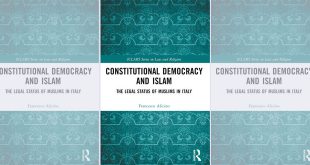Ayatollah Hajj Shaikh Murtaza Mutahhari Farimani (1920–79) was from a clerical family, a pupil of Ayatollah Khomeini, a university Professor of Philosophy and a Mujtahid (jurist) in Islamic law at the Shi‘ite seminary.
Ayatollah Murtaza Mutahhari was a significant figure in the movement which brought the Islamic Republic of Iran into being. Mutahhari, a student of Ayatollah Khomeini and particularly close to his mentor, had broad theoretical concerns regarding religion, society and economy. He is generally considered as a prominent contemporary intellectual figure among the Iranian and Shi’ite scholars of the time. This book describes the life and works of this philosopher, jurist, preacher and writer, who was educated in the Qum Seminary and worked in Tehran.
The manifestations of Islamism are quite visible, today, not only in the Islamic world, but also in the West among Muslim minorities. Islamic practices, such as wearing the Islamic veil (hijab), growing a beard, consuming Islamically slaughtered (halal) meat, non-alcoholic drinks, etc., are all familiar to Western people. These rituals are currently observed, not only in traditional and ordinary Muslim circles, but also by enthusiastic top Muslim academics and political activists who have been educated in well-known Western universities.
While most Islamic societies were under the influence and severe pressure of (state-) secular ideologies such as Marxism, socialism and nationalism for almost half a century, the tendency towards Islamism rose and gradually expanded in reaction to those state-propagated ideologies. At first, the Islamist movements were relatively limited and local; however, they progressed and intensified, covering the vast majority of people, influencing their lives and ideals, mobilizing them towards independence and self-reliance. Thus an international network was established after the victory of the Islamic Revolution in Iran (1979) that has become a source of hope even for many non-Islamic movements. This revolution undoubtedly played a role in promoting Islamic feelings and consciousness among the Muslim masses around the globe. The Islamists, regardless of their differences in policy, adopted Islam as their identity, their way of living and their strategy. However, they may be classified into three groups: (i) the rigid, extreme, superficial; (ii) the moderate, logical and truthful; and (iii) the liberal, pragmatist and compromising. All three share the view that Islam holds the key to their present and future problems.
This present massive tendency towards Islamism or, in my own words, an Islamic type of living, among Muslims, is indeed the result of several lifetime endeavours by Muslim theoreticians and political activists, including Ayatullah Mutahhari. His role is more visible than others, perhaps, in rendering Islam an up-to-date comprehensive social-political ideology compatible with modern times and present needs. His writings are still widely distributed and massively read in Islamic groups and Shi‘ite communities. As a distinguished Islamic leader, he played a very important role, particularly in the case of Iran’s Islamic Revolution. Therefore, he can be considered as a major force behind present-day Islamism and Islamic movements, especially in its Shi‘i branch….
Bibliographic Information
Title: The Political Thought of Ayatollah Murtaza Mutahhari: An Iranian Theoretician of the Islamic State
Author(s): Mahmood T. Davari
Publication: Routledge
Language: English
Length: 212 pages
ISBN:
Pub. Date:
THE POLITICAL THOUGHT OF AYATOLLAH MURTAZA MUTAHHARI AN IRANIAN
 Ijtihad Network Being Wise and Faithful Muslim in the Contemporary World
Ijtihad Network Being Wise and Faithful Muslim in the Contemporary World

